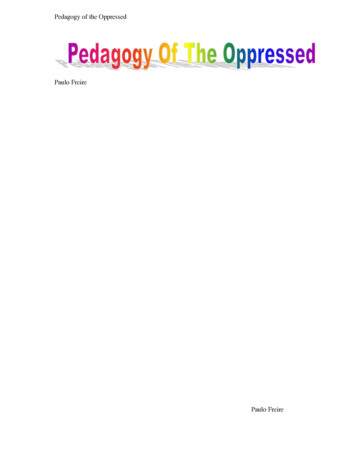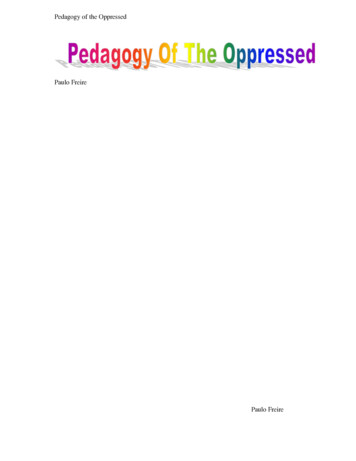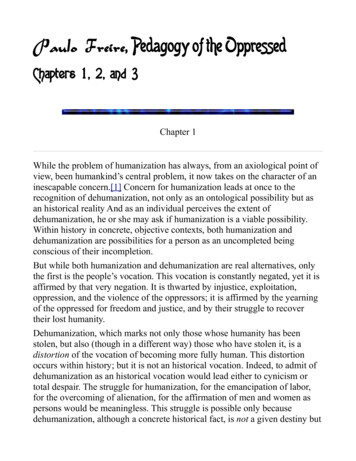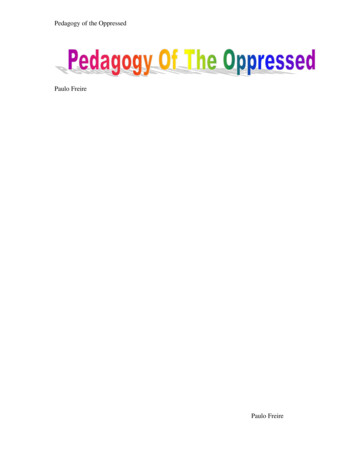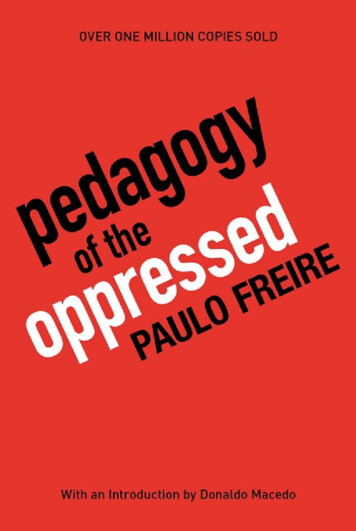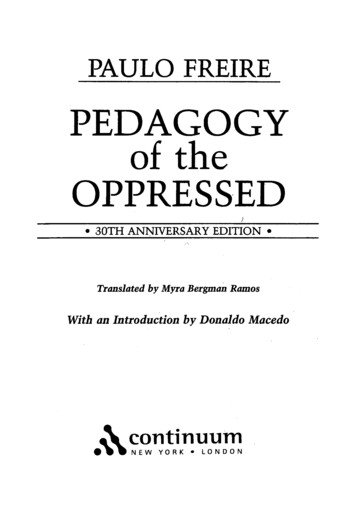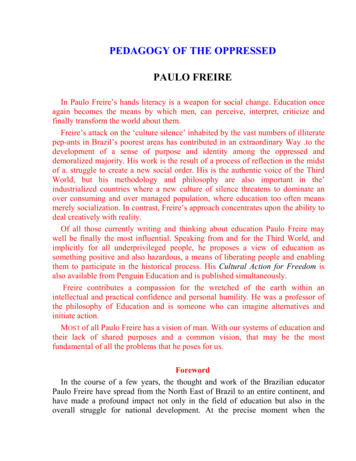
Transcription
PEDAGOGY OF THE OPPRESSEDPAULO FREIREIn Paulo Freire’s hands literacy is a weapon for social change. Education onceagain becomes the means by which men, can perceive, interpret, criticize andfinally transform the world about them.Freire’s attack on the ‘culture silence’ inhabited by the vast numbers of illiteratepep-ants in Brazil’s poorest areas has contributed in an extraordinary Way .to thedevelopment of a sense of purpose and identity among the oppressed anddemoralized majority. His work is the result of a process of reflection in the midstof a. struggle to create a new social order. His is the authentic voice of the ThirdWorld, but his methodology and philosophy are also important in the’industrialized countries where a new culture of silence threatens to dominate anover consuming and over managed population, where education too often meansmerely socialization. In contrast, Freire’s approach concentrates upon the ability todeal creatively with reality.Of all those currently writing and thinking about education Paulo Freire maywell be finally the most influential. Speaking from and for the Third World, andimplicitly for all underprivileged people, he proposes a view of education assomething positive and also hazardous, a means of liberating people and enablingthem to participate in the historical process. His Cultural Action for Freedom isalso available from Penguin Education and is published simultaneously.Freire contributes a compassion for the wretched of the earth within anintellectual and practical confidence and personal humility. He was a professor ofthe philosophy of Education and is someone who can imagine alternatives andinitiate action.MOST of all Paulo Freire has a vision of man. With our systems of education andtheir lack of shared purposes and a common vision, that may be the mostfundamental of all the problems that he poses for us.ForewordIn the course of a few years, the thought and work of the Brazilian educatorPaulo Freire have spread from the North East of Brazil to an entire continent, andhave made a profound impact not only in the field of education but also in theoverall struggle for national development. At the precise moment when the
disinherited masses in Latin America are awakening, from their traditional lethargyand are anxious to participate, as subjects, in the development of their countries,Paulo Freire has perfected a method for teaching illiterates that has contributed, inan extraordinary way, to that process. In fact, those who, in learning to read andwrite, come to a new awareness of selfhood and begin to look critically at thesocial situation in which they find themselves, often take the initiative in acting totransform the society that has denied them this opportunity of participation.Education is once again a subversive force.In the United States, we are gradually becoming aware of the work of PauloFreire, but thus far we have thought of it primarily in terms of its contribution tothe education of illiter-ate adults in the Third World, If, however, we take a closerlook, we may discover that his methodology as well as his educational philosophyare as important for us as for the dis-possessed in Latin America. Their struggle tobecome free subjects and to participate in the transformation of their society issimilar, in many ways, to the struggle not only of blacks and Mexican-Americans,-but also of middle-class young people. And the sharpness and intensity of thatstruggle in the developing world may well provide us with new insight, newmodels, and a new hope as we face our own situation. For this reason I considerthe publication of Pedagogy of the Oppressed in an’ English edition to besomething of an event.Paulo Freire’s thought represents the response of a creative mind and sensitiveconscience to the extraordinary misery and suffering of the oppressed around him.Born in 1921 in Recife, the centre of one of the most extreme situations of povertyand underdevelopment in the Third World, he was .soon forced to experience thatreality directly. As the economic crisis in 1929 in the United States began to affectBrazil, the precarious stab-ility of Freire’s middle-class family gave way and hefound himself sharing the plight of the ‘wretched of the earth’. This had a profoundinfluence on his life as he came to know the gnawing pangs of hunger and fellbehind in school because of the listlessness it produced; it also led him to make avow, at the age of eleven, to dedicate his life to the struggle against hunger, so thatother children would not have to know the agony he was then experiencing.His early sharing of the life of the poor also led him to the discovery of what hedescribes as the ‘culture of silence’ of the dispossessed. He came to realize thattheir ignorance and lethargy were the direct product of the whole situation ofeconomic, social, and political domination - and of the paternalism - of which theywere victims. Rather than being encouraged and equipped to know and respond tothe concrete realities of their world, they were kept ‘submerged’ in a situation inwhich such critical awareness and response were practically impossible. And it
became clear to him that the whole educational system was one of the majorinstruments for the maintenance of this culture of silence.Confronted by this problem in a very existential way, Freire turned his attentionto the field of education and began to work on it. Over the years he has engaged ina process of study and reflection that has produced something quite new andcreative in educational philosophy. From a situation of direct engage-ment in thestruggle to liberate men and women for the creation of a new world, he has reachedout to the thought and experi-ence of those in many different situations and ofdiverse philo-sophical positions: in his words, to ‘Sartre and Mounier, Eric Frommand Louis Althusser, Ortega Y. Gasset and Mao, Martin Luther King and CheGuevara, Unamuno and Marcuse’. He has made use of the insights of these men todevelop a pers-pective on education which is authentically his own and whichseeks to respond to the concrete realities of Latin AmericaHis thought on the philosophy of education was first expressed in 1959 in hisdoctoral dissertation at the University of Recife, and later in his work as Professorof the History and Philosophy of Education in the same university, as well as in hisearly experiments with the teaching of illiterates in that same city. Themethodology he developed was widely used by Catholics and others in literacycampaigns throughout the North East of Brazil, and was considered such a threat tothe old order that Freire was jailed immediately after the military coup in 1964.Released seventy days later and encouraged to leave the country, Freire went toChile, where he spent five years working with UNESCO and the Chilean Institutefor. Agrarian Reform in programmes of adult education. He then acted asconsultant at Harvard University’s School of Educa-tion, and worked in closeassociation with a number of groups engaged in new educational experiments inrural and urban areas. He is presently serving as Special Consultant to the Office ofEducation of the World Council of Churches in Geneva.Freire has written many articles in Portuguese and Spanish, and his first book,Educaao como Pratica da Liberdade, was published in Brazil in -1967. His latestand “most complete work, Pedagogy of the Oppressed, is the first of his writings tobe published in the United States.In this brief introduction, there is no point in attempting to sum up, in a fewparagraphs, what the author develops in a number of pages. That would be anoffence to the richness, depth, and complexity of his thought. But perhaps a wordof witness has its place here - a personal witness as to why I find a dialogue withthe thought of Paulo Freire an exciting ad-venture. Fed up as I am with theabstractness and sterility of so much intellectual work in academic circles today, Iam ex-cited by a process of reflection which is set in a thoroughly historicalcontext, which is carried on in the midst of a struggle to create a new social order
and thus represents a new unity of theory and praxis. And I am encouraged when aman of the stature of Paulo Freire incarnates a rediscovery of the human-izingvocation of the intellectual, and demonstrates the power of thought to negateaccepted limits and open the way to a new future.Freire is able to do this because he operates on .one basic assumption: thatman’s oncological vocation (as he calls it) is to be a subject who acts upon andtransforms his world, and in so doing moves towards ever new possibilities offuller and richer life individually and collectively. This ‘world’ to which; he relatesis not a static and closed order, a given reality which man must accept and to whichhe must adjust; rather, it is a problem to be worked on and solved. It is the materialused by man to create history, a task which he performs as he overcomes thatwhich is dehumanizing at any particular time and place and dares to create thequalitatively new. For Freire, the resources for that task at the present time areprovided by the advanced technology of our Western world, but the social visionwhich impels us to negate the present order and demon-strate that history has notended comes primarily from the suffering and struggle of the people of the ThirdWorld.Coupled with this is Freire’s conviction (now supported by a wide backgroundof experience) that every human being, no matter how ‘ignorant’ or submerged inthe ‘culture of silence’ he may be, is capable of looking critically at his world in adialogical encounter with others. Provided with the proper tools for such anencounter, he can gradually perceive his personal and social reality as well as thecontradictions in it, become conscious of his own perception of that reality, anddeal critically with it. In this process, the old, paternalistic teacher - studentrelationship is overcome. A peasant can facilitate this process for his neighbourmore effectively than a ‘teacher’ brought in from outside. ‘Men educate each otherthrough the mediation of the world.’As this happens, the word takes on new power. It is no longer an abstraction ormagic but a means by which man discovers himself and his potential as he givesnames to things around him. As Freire puts it, each man wins back his right to sayhis own word, to name the world.When an illiterate peasant participates in this sort of educa-tional experience, hecomes to a new awareness of self, has a new sense of dignity, and is stirred by anew hope. Time and again, peasants have expressed these discoveries in strikingways after a few hours of class: ‘I now realize I am a man, an educated man.’ ‘Wewere blind, now our eyes have been opened.’ Before this, words meant nothing tome; now they speak to me and I can make them speak.’ ‘Now we will no longer bea dead weight on the cooperative farm.’ When this happens in the process oflearning to read, men discover that they are creators of culture, and that all their
work can be creative. ‘I work, and working I transform the world.’ And as thosewho have been completely marginalized are so radically transformed, they are nolonger willing to be mere objects, responding to changes occurring around them;they are more likely to decide to take upon themselves the struggle to change thestructures of society which until now have served to oppress them. For this reason,a distinguished Brazilian student of national development recently affirmed thatthis type of educa-tional work among the people represents a new factor in socialchange and development, ‘a new instrument of conduct for the Third World, bywhich it can overcome traditional structures and enter the modern world.At first sight Paulo Freire’s method of teaching illiterates in Latin Americaseems to belong to a different world from that in which we find ourselves.Certainly it would be absurd to claim that it should be copied here. But there arecertain parallels in the two situations which should not be overlooked. Ouradvanced technological society is rapidly making objects of most of us and subtlyprogramming us into conformity to the logic of its system. To the degree that thishappens, we are also be-coming submerged in a new ‘culture of silence’.The paradox is that the same technology which does this to us also creates a newsensitivity to what is happening. Especially among young people, the new mediatogether with the erosion of old concepts of authority open the way to acuteawareness of this new bondage. The young perceive that their right to say theirown word has been stolen from them, and that few things are more important thanthe struggle to win it back. And they also realize that the educational system today- from kindergarten to university - is their enemy.There is no such thing as a neutral educational process.Education either functions as an instrument which is used to facilitate theintegration of the younger generation into the logic of the present system and bringabout conformity to it, or it becomes ‘the practice of freedom’, the means by whichmen and women deal critically and creatively with reality and dis-cover how toparticipate in the transformation of their world. The development of an educationalmethodology that facilitates this process will inevitably lead to tension and conflictwithin our society. But it could also contribute to the formation of a new man andmark the beginning of a new era in Western history. For those who are committedto that task and are searching for concepts and tools for experimentation, PauloFreire’s thought may make a significant contribution in the years ahead.Richard ShaullPreface
These introductory pages to Pedagogy of the Oppressed own the result of myobservations during the last six years of political exile, observations which haveenriched those previously afforded by my educational activities in Brazil.I have encountered, both in training courses which analyse the role of‘conscientization’ and in actual experimentation with a genuinely liberatingeducation, the ‘fear of freedom’ discussed in the first chapter of this book. Notinfrequently, training course participants call attention to ‘the danger of“conscientization” in a way which reveals their own fear of freedom. Criticalconsciousness, they say, is anarchic; others add that critical consciousness maylead to disorder. But some confess: Why deny it? I was afraid of freedom. I am nolonger afraid!In one of these discussions, the group was debating whether the conscientizationof men to a specific case of injustice might not lead them to ‘destructivefanaticism’ or to a ‘sensation of total collapse of their world’. In the midst of theargument a man who previously had been a factory worker for many years spokeout: ‘Perhaps I am the only one here of working-class origin. I can’t say that I’veunderstood everything you’ve said just now, but I can say one thing - when I beganthis course I was naive, and when I found out how naive I was, I started to getcritical. But this discovery hasn’t made me a fanatic, and I don’t feel any collapseeither,’Doubt regarding the possible effects of conscientization implies a premise whichthe doubter does not always make explicit: It is better for the victims of injusticenot to recognize themselves as such. In fact, conscientization does not lead men to‘destructive fanaticism’. On the contrary, by making it possible for men to enterthe historical process as responsible subjects, conscientization enrols them in thesearch for self-affirmation, thus avoiding fanaticism.The awakening of critical consciousness leads the way- to the expres-sion ofsocial discontents precisely because these discontents are real components of anoppressive situation.Fear of freedom, of which its possessor is not necessarily aware, makes him seeghosts. Such an individual is actually taking refuge in an attempt to achievesecurity, which he prefers to the risks of liberty. As Hegel testifies in ThePhenomenology of Mind:It is solely by risking life that freedom is obtained;. the individual who has notstaked his life may, no doubt, be recognized as a Person; but he has not attainedthe truth of this recognition as an independent self-consciousness.Men rarely admit their fear of freedom openly, however, tend-ing rather tocamouflage it - sometimes unconsciously - by presenting themselves as defenders
of freedom. They give their doubts and misgivings an air of profound sobriety, asbefitting custodians of freedom. But they confuse freedom with the maintenance ofthe status quo; so that if conscientization threatens to place that status quo inquestion, it thereby seems to constitute a threat to freedom itself.Thought and study alone did not produce Pedagogy of the Oppressed; it isrooted in concrete situations and describes the reactions of workers (peasant orurban) and of the members of the middle-class whom I have observed directly orindirectly during the course of my educative work. Continued observation will giveme an opportunity to modify or to corroborate in later studies the points putforward in this introductory work.This volume will probably arouse negative reactions in a number of readers.Some will regard my position vis-à-vis the problem of human liberation as purelyidealistic, or may even consider discussion of ontological vocation, love, dialogue,hope, humility, and sympathy as so much reactionary ‘blah’. Others will not (orwill not wish to) accept my denunciation of a state of oppression which gratifiesthe oppressors. Accordingly, this admittedly tentative work is for radicals. I amcertain that Christians and Marxists, though they may disagree with me in part orin whole, will continue reading to the end. But the reader who dogmaticallyassumes closed ‘irrational’ positions will reject the dialogue I hope this book willopen.Sectarianism, fed by fanaticism, is always castrating. Radicalization, nourishedby a critical spirit, is always creative. Sec-tarianism makes myths and therebyalienates; radicalization is critical and thereby liberates. Radicalization involvesin-creased commitment to the position one has chosen, and thus ever greaterengagement in the effort to transform concrete, objective reality. Conversely,sectarianism, because it is myth-making and irrational, turns reality into a false(and therefore unchangeable) ‘reality’.Sectarianism in any quarter is an obstacle to the emancipa-tion of mankind. TheRightist version thereof does not always, unfortunately, call forth its naturalcounterpart: radicalization of the revolutionary. Not infrequently, revolutionariesthem-selves become reactionary by falling into sectarianism in the process ofresponding to the sectarianism of the Right. This possibility, however, should notlead the radical to become a docile pawn of the elites. Engaged in the process ofliberation, he cannot remain passive in the face of the oppressor’s violence.On the other hand, the radical is never a subjectivist. For him the subjectiveaspect exists only in relation to the objective aspect (the concrete reality which isthe object of his analysis). Subjectivity and objectivity thus join in a dialecticalunity producing knowledge in solidarity with action, and vice versa.
For his part, the sectarian of whatever persuasion, blinded by his irrationality,does not (or cannot) perceive the dynamic of reality - or else he misinterprets it.Should he think dialectic-ally, it is with a ‘domesticated dialectic’. The Rightistsectarian whom I have earlier, in Educayao como Pratica da Liberdade, termed a‘born sectarian’) wants to slow down the historical process, to ‘domesticate’ timeand thus to domesticate men. The Leftist-turned-sectarian goes totally astray whenhe attempts to interpret reality and history dialectically, and falls into essentiallyfatalistic positions.The Rightist sectarian differs from his Leftist counterpart in that the formerattempts to domesticate the present so that (he hopes) the future will reproduce thisdomesticated present, while the latter considers the future pre-established - a kindof inevitable fate, fortune, or destiny. For the Rightist sectarian, ‘today’, linked tothe past, is something given and immutable; for the Leftist sectarian, ‘tomorrow’ isdecreed beforehand, is inexorably pre-ordained. This Rightist and this Leftist areboth reactionary because, starting from their respective false views of history, bothdevelop forms of action which negate freedom. The fact that one man imagines a‘well-behaved’ present and the other a predetermined future does not mean thatthey therefore fold their arms and become spectators (the former expecting that thepresent will continue, the latter waiting for the already ‘known’ future to come topass). On the contrary, closing themselves into ‘circles of certainty’ from whichthey cannot escape, these men ‘make’ their own truth. It is not the truth of menwho struggle to build the future, running the risks involved in this veryconstruction. Nor is it the truth of men who fight side by side and learn togetherhow to build this future - which is not something given to be received by men, butis rather something to be created by them. Both types of sectarian, treating historyin an equally proprietary fashion end up without the people - which are anotherway of being against them.While the Rightist sectarian, closing himself in ‘ his’ truth, does no more thanfulfil his natural role, the Leftist who becomes sectarian and rigid negates his verynature. Each, however, as he revolves about ‘his’ truth, feels threatened if that truthis questioned. Thus, each considers anything that is not ‘his’ truth a He. As thejournalist Marcio Moreira Alves once told me: “They both suffer from an absenceof doubt.’The radical, committed to human liberation, does not become the prisoner of a‘circle of certainty’ within which he also imprisons reality. On the contrary, themore radical he is, the more fully he enters into reality so that, knowing it better, hecan better transform it. He is not afraid to confront, to listen, to see the worldunveiled. He is not afraid to meet the people or to enter into dialogue with them.
He does not consider himself the proprietor of history or of men, or the liberator ofthe oppressed; but he does commit himself, within history, to fight at their side.The pedagogy of the oppressed, the introductory outlines of which are presentedin the following pages, is a task for radicals; it cannot be carried out by sectarians.I will be satisfied if among the readers of this work there are those sufficientlycritical to correct mistakes and mis-understandings, to deepen affirmations and topoint out aspects I have not perceived. It is possible that some may question myright to discuss revolutionary cultural action, a subject of which I have no concreteexperience. However, the fact that I have not personally participated inrevolutionary action does not disqualify me from reflecting on this theme.Furthermore, in my experience as an educator with the people, using a dialogicaland problem-posing education, I have accumulated a comparative wealth ofmaterial which challenged me to run the risk of making the affirmations containedin this work.From these pages I hope at least the following will endure: my trust in thepeople, and my faith in men and in the creation of a world in which it will be easierto love.Here I would like to express my gratitude to Elza, my wife and ‘first reader’, forthe understanding and encouragement she has shown my work, which belongs toher as well. I would also like to extend my thanks to a group of friends for theircomments on my manuscript. At the risk of omitting some names, I must mentionJoao da Veiga Coutinho, Richard Shaull, Jim Lamb, Myra and Jovelino Ramos,Paulo de Tarso, Almino Affonso, Plinio Sampaio, Ernani Maria FJori, MarcelaGajardo, Jos6 Luis Fiori, and Joao Zacarioti. The responsibility for the affirmationsmade herein is, of course, mine alone.Chapter 1While the problem of humanization has always been, from an axiological pointof view, man’s central problem, it now takes on the character of an inescapableconcern. Concern for humanization leads at once to the recognition ofdehumanization, not only as an ontological possibility but as an historical reality.And as man perceives the extent of dehumanization, he asks himself ifhumanization is a viable possibility. Within history, in concrete, objective contexts,both humanization and dehumanization are possibilities for man as an uncompletedbeing conscious of his incompleteness.But while both humanization and dehumanization are real alternatives, only thefirst is man’s vocation. This vocation is constantly negated, yet it is affirmed bythat very negation. It is thwarted by injustice, exploitation, oppression, and the
violence of the oppressors; it is affirmed by the yearning of the oppressed forfreedom and justice, and by their struggle to recover their lost humanity.Dehumanization, which marks not only those whose humanity, has been stolen,but also (though in a different way) those who have stolen it, is a distortion of thevocation of becoming more fully human. This distortion occurs within history; butit is not an historical vocation. Indeed, to accept dehumanization as an historicalvocation would lead either to cynicism or total despair. The struggle forhumanization, for the emancipation of labour, for the overcoming of aliena-tion,for the affirmation of men as persons would be meaningless. This struggle ispossible only because dehumanization, although a concrete historical fact, is not agiven destiny but the result of an unjust order that engenders violence in theoppressors, which in turn dehumanizes the oppressed.Because it is a distortion of being more fully human, sooner or later being lesshuman leads the oppressed to struggle against those who made them so. In orderfor this struggle to have meaning, the oppressed must hot, in seeking to regain theirhumanity (which is a way to create it), become in turn oppres-sors of theoppressors, but rather restorers of the humanity of both.This, then, is the great humanistic and historical task of the oppressed: toliberate themselves and their oppressors as well. The oppressors, who oppress,exploit, and rape by virtue of their power, cannot find in this power the strength toliberate either the oppressed or themselves. Only power that springs from theweakness of the oppressed will be sufficiently strong to free both. Any attempt to‘soften’ the power of the oppressor in deference to the weakness of the oppressedalmost always manifests itself in the form of false generosity; indeed, the attemptnever goes beyond this. In order to have the continued opportunity to express their‘generosity’, the oppressors must perpetuate injustice as well. An unjust socialorder is the permanent fount of this ‘generosity’, which is nourished by death,despair, and poverty. That is why its dispensers become desperate at the slightestthreat to the source of that false generosity.True generosity consists precisely in fighting to destroy the causes whichnourish false charity. False charity constrains the fearful and subdued, the ‘rejectsof life’, to extend their trembling hands. Real generosity lies in striving so thatthose hands - whether of individuals or entire peoples - need be extended less andless in supplication, so that more and more they become human -hands which workand, by working, transform the world.This lesson and apprenticeship must come, however, from the oppressedthemselves and from those who are truly with them. By fighting for the restorationof their humanity, as individuals or as peoples, they will be attempting the
restoration of true generosity. Who are better prepared than the oppressed tounderstand the terrible significance of an oppressive society? Who suffer theeffects of oppression more than the oppressed? Who can better understand thenecessity of liberation? It will not be defined by chance but through the praxis oftheir quest for it, through recognizing the necessity to fight for it. And this fight,because of the purpose given it by the oppressed, will actually constitute an act oflove opposing the lovelessness which lies at the heart of the oppressors’ violence,lovelessness even when clothed in false generosity.But almost always, during the initial stage of the struggle, the oppressed, insteadof striving for liberation, tend themselves to become oppressors, or ‘suboppressors’. The very structure of their thought has been conditioned by thecontradictions of the concrete, existential situation by which they were shaped.Their ideal is to be men; but for them, to be a ‘man’ is to be an oppressor. This istheir model of humanity. This phenomenon derives from the fact that theoppressed, at a certain moment of their existential experience, adopt an attitude of‘adherence’ to the oppressor. Under these circumstances they cannot ‘consider’him sufficiently clearly to objectify him - to discover him ‘outside’ themselves.This does not necessarily mean that the oppressed are not aware that they aredown-trodden. But their perception of themselves as oppressed is impaired by theirsubmersion in the reality of oppression. At this level, their perception ofthemselves as opposites of the oppressor does not yet signify involvement in astruggle to overcome the contradiction; the one pole aspires not to liberation, but toidentification with its opposite pole.In this situation the oppressed cannot see the ‘new man’ as the man to be bornfrom the resolution of this contradiction in the process of oppression giving way toliberation. For them, the new man is themselves become oppressors. Their visionof the new man is individualistic; because of their identification with the oppressor,they have no consciousness of themselves as persons or as members of anoppressed class. It is not to
the publication of Pedagogy of the Oppressed in an' English edition to be something of an event. Paulo Freire's thought represents the response of a creative mind and sensitive conscience to the extraordinary misery and suffering of the oppressed around him. Born in 1921 in Recife, the centre of one of the most extreme situations of poverty .
